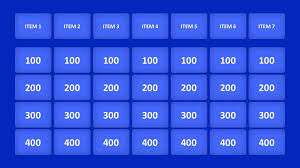Intelligence
What's Your Jeopardy Dream Board?
It's useful to identify your areas of expertise.
Posted November 12, 2020 Reviewed by Matt Huston

In a classic episode of Cheers, barfly Cliff Claven ends up on the game show Jeopardy!
Host Alex Trebek (who died this week, spawning much fond remembrance) introduces the other two contestants. One’s a lawyer and the other’s a neurosurgeon. Alex introduces Cliff as a mailman.
But Clavin lucks out. The categories are all absolutely in his wheelhouse. In the studio audience, Norm turns to Woody and whispers: “That’s Cliff’s Dream Board.”
Sure enough, Clavin tears through the clues and, with snowballing confidence, builds a huge lead—only to be sunk by a reckless bet in Final Jeopardy.
(Trebek was apparently delighted by the episode. Thereafter on the show he would sometimes caution contestants who were running away with the game not to “pull a Cliff Clavin” and risk crashing out with an unnecessarily big wager at the end.)
There’s enough psychology in this episode to chew on for a week.
It turns out that Cliff’s Final Jeopardy response—“Who are three people who have never been in my kitchen?”—while not what the judges were looking for, isn’t actually wrong. That plot point, writer Dan O’Shannon explained, came from his insight that “anyone could win all the money on Jeopardy! every night if they wanted, because for each answer given on the show, there are an infinite number of technically correct questions.”
Observers have called Cliff’s attempted Houdini move at the buzzer an example of divergent thinking. It creatively invites multiple solutions rather than a single solution. In that sense, the episode is a sly takedown of typical notions of intelligence. The lowly mail carrier is smarter than he realizes, because the world is measuring smartness wrong. Upon reflection, Trebek realizes that Cliff has been jobbed, and he shows up at the bar to apologize, and to fall on his sword.
The story's also a kind of revenge fantasy against the pretentious know-it-alls in your life. Everyone has some areas of expertise, after all—even if they aren’t big-league things like nuclear medicine or military history. Maybe it’s Dr. Who, '80s hair bands, Russian cuss words and hockey jersey numbers.
So here’s the game. Communities of online Jeopardy! fans have been playing it online for awhile; it’s time to release it into the wild. Ask yourself:
What’s your Jeopardy! Dream Board?
This is a perfect COVID lockdown activity. Better still when you pull in your nerdier friends. Who doesn’t love a good pseudoscientific parlour game to get everyone thinking and talking about their favourite subject: themselves! You open up a bit; you learn some things about each other. Most people are actually better at identifying other people’s strengths than they are at identifying their own. It’s useful to have your besties point out the little flowers growing in the shade of your own humility.
The Jeopardy! Dream Board game is DIY therapy.
Research suggests that reminding ourselves of our core strengths can help us push through challenging situations. It works in an outward direction as well; psychologists who reflect on their clients’ better angels before a session have seen more improvement in those clients. (The technique is called “resource priming.”)
Your character strengths are really latent superpowers. Draw them out and they become a potent tool you can bring to bear whenever you feel the stirrings of doubt.
Jeopardy!-type knowledge is of course different from core character strengths. But think of it this way: Knowledge reflects your passion for a subject. And passion is where the very zest of you finds expression. The late University of Michigan psychologist Chris Peterson—co-creator of the Values In Action Inventory—identified “zest” as one of 24 core character strengths. It’s actually among the half-dozen most robustly associated with life satisfaction. If you’ve got zest, you’re halfway there, as the soap manufacturer almost said.
So to survey your Jeopardy! Dream Board is really to be reminded of where you’ve chosen to plant your flag in this life. It’s like that app on your smartphone that tells you where all your time is going. To quant your heart out is never a bad thing.
By the way, this was Cliff Clavin’s Dream Board:
Civil Servants, Stamps From Around the World, Mothers and Sons, Beer, Bar Trivia, and Celibacy.
Your turn.




